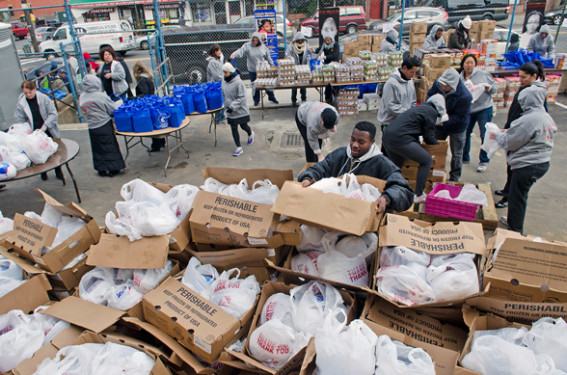
By Christopher White, The Tablet National Correspondent
Catholic Charities, a network of Catholic charitable groups across the country – not the government – should be on the front lines of fighting poverty, according to Speaker of the House Paul Ryan.
Ryan, a Catholic, spoke to a town hall gathering of clients and supporters at Catholic Charities of Forth Worth, Texas on Tuesday, where he said that they, along with others such as the Salvation Army, are doing “a good job at a human, personal level,” and it was the duty of the government to provide resources but not to dictate their work.
“We have not been able to get our hands around breaking the cycle of poverty in this country, and we’ve got to think about how to do that, and you are showing us exactly how that can work,” he said.
Ryan said he visited the organization so that he can “see with my own two eyes” the work of Catholic Charities firsthand.
In an exchange with Heather Reynolds, President and CEO of Catholic Charities in Fort Worth, Texas, Ryan said he would like to consolidate the approximately 80 federal government programs dedicated to fighting poverty in favor of “local units and local government.”
Ryan praised the work of Catholic Charities as a more desirable alternative, adding that the “cookie cutter, Washington-knows-best approach doesn’t work.”
“We agree,” responded Reynolds to Ryan’s lamentations.
“How do we change the paradigm so that the federal government is not frustrating, displacing, creating barriers, harming efforts to fight poverty?” Ryan asked.
“How can we make sure all these taxpayer dollars that are going to a good cause are done more effectively, and how do they work in partnership with philanthropy and the private sector so that we can all basically harness and harmonize our efforts to an outcome-based approach?” he asked.
In May 2016, Reynolds sent an open letter to Ryan where she recalled her recent testimony before the Ways and Means Committee hoping to change Ryan’s views on poverty.
Soon thereafter, Ryan announced that he had changed his views on poverty and apologized for referring to government recipients of benefits as “takers.”

“I firmly believe that government-run poverty programs are not the answer. The answer is to allow the right non-profits to tailor help based on needs,” Reynolds wrote in 2016. “Government’s most useful role is in directing resources our way, to non-profits with proven success, to provide the services that we know work to get people out of poverty for good.”
She went on to encourage Ryan to embrace a holistic approach to poverty, as modeled by Catholic Charities.
Earlier this year, Ryan headlined the annual Al Smith Dinner, one of the Catholic Church’s most storied fundraising events in the United States, where he praised the collective work of Catholic charities around the country.
Over the past year, however, Ryan has come under fire by some Catholics for supporting President Donald Trump’s tax policies and budget proposals that the U.S. bishops have said would have harmful effects on the nation’s poor.
After Ryan’s visit, Bishop Michael Olson of Forth Worth emphasized that the speaker’s visit was not a partisan visit and that he considered it “an honor, a moment for gratitude, and, as a bishop, a source of pride for Catholic Charities.”
Bishop Olson emphasized that Ryan engaged in conversation with the workers of Catholic Charities, listened as much as he spoke, and everyone was in agreement that “the status quo is insufficient.”
“There was a willingness to think outside of the box,” Bishop Olson noted, saying that Ryan was not interested in either victim-blaming or simply throwing money at an issue without asking whether it’s actually working.
He added that Ryan did not advocate “abandonment or abdication” of the role the government must play in fighting poverty, but instead pushed for the development of subsidiarity and the preferential option for the poor.
Ryan is a former altar boy, who has long boasted of how his Catholic faith informs his policy positions. After former Speaker of the House John Boehner stepped down from Congress in 2015, Ryan was elevated to the post only after some nudging from New York’s Cardinal Timothy Dolan, who called Ryan at the request of Boehner to encourage him to take the post.
On Wednesday, Ryan said that the United States is in need of the talent and contributions of the poor.
“We need the poor…we need their talents in the economy,” said Ryan. “We need them to share their talents with us, the rest of the economy, so the economy grows. There’s no reason why they should not be able to get themselves a life of opportunity and upward mobility.”
“If there were ever a time when people who are marginalized are more needed by the rest of society, this is it,” he said.
